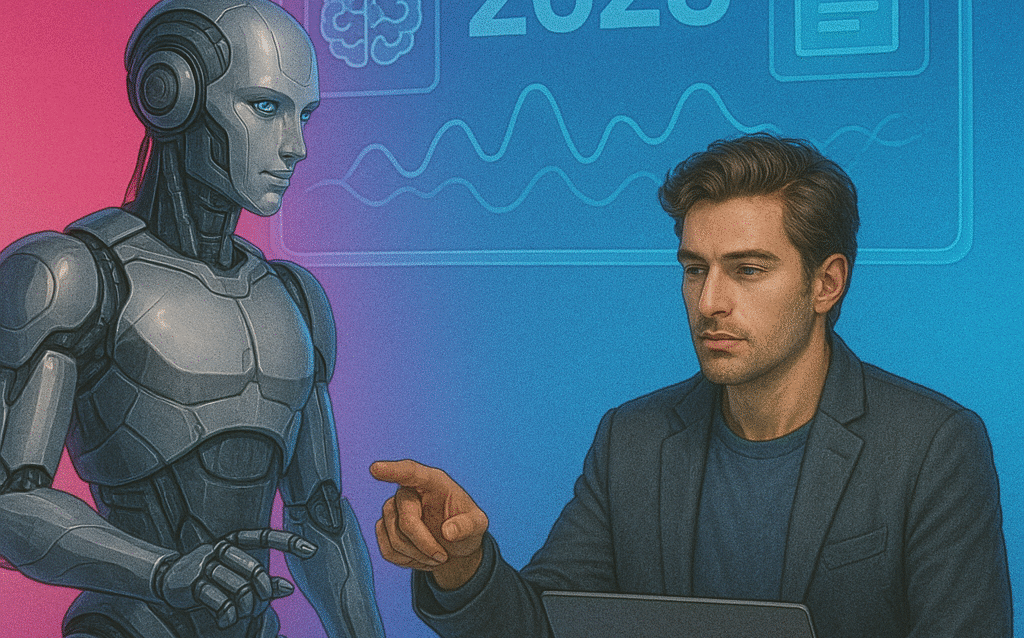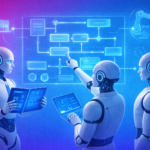The Synergistic Leap in AI Agent Development
In 2025, the world of Artificial Intelligence is experiencing an unprecedented acceleration, largely driven by the symbiotic relationship between AI agents and Generative AI. While AI agents autonomously pursue goals, make decisions, and interact with their environments, Generative AI (particularly large language models, or LLMs, and multimodal models) provides the cognitive engine that powers their advanced capabilities. This collaboration is transforming AI agents from sophisticated automation tools into truly intelligent, adaptable, and creative entities.
The advancements in Generative AI over the past few years, especially leading into 2025, have unlocked new frontiers for agent development. We’re moving beyond pre-programmed responses and rule-based systems to agents that can understand nuanced context, generate novel content, reason through complex problems, and learn from dynamic environments. This guide explores the latest breakthroughs in generative AI agents in 2025 and the profound impact of these AI agent innovations on various industries.
Advancements in Generative AI Powering Agent Development
The rapid evolution of Generative AI forms the bedrock of next-generation AI agents. Key advancements in 2025 include:
- Multimodal Generative Models: Beyond text, generative models now seamlessly process and generate content across various modalities – text, images, audio, video, and even 3D models. For AI agents, this means they can understand visual cues in customer support, generate personalized video responses in marketing, or interpret tone in voice calls, leading to richer, more human-like interactions.
- Enhanced Contextual Understanding and Long-Term Memory: LLMs are becoming far more adept at maintaining context over extended conversations and integrating information from various sources into a coherent “long-term memory.” This allows AI agents to engage in deeper, more complex interactions without losing track of previous statements or preferences, making them invaluable for sustained customer relationships or project management.
- Improved Reasoning and Planning Capabilities: Generative AI models are evolving to demonstrate more sophisticated reasoning abilities, allowing AI agents to break down complex goals into logical sub-tasks, anticipate potential roadblocks, and formulate multi-step plans. This is crucial for autonomous agents that need to navigate dynamic environments or solve intricate business problems.
- Parameter-Efficient Fine-Tuning (PEFT) at Scale: New techniques allow for highly efficient fine-tuning of large generative models on specific, smaller datasets without retraining the entire model. This makes it faster and more cost-effective for businesses to customize AI agents for highly specialized tasks, ensuring they perform optimally within a specific domain (e.g., legal, medical, or a niche product line).
- Real-time Learning and Adaptation: Generative AI-powered agents are increasingly capable of real-time learning. They can adapt their responses and strategies based on immediate feedback or new information encountered during an interaction, leading to continuous self-improvement and more agile problem-solving.
- Ethical AI and Bias Mitigation in Generative Models: Significant research and development in 2025 are focusing on building more robust ethical safeguards into generative models, aiming to reduce inherent biases and ensure fair, transparent, and explainable agent behaviors. This is crucial for trusted deployment in sensitive areas like HR or finance.
How Generative AI Enhances AI Agent Capabilities
Generative AI doesn’t just add features; it fundamentally redefines what AI agents are capable of.
- Unprecedented Natural Language Understanding and Generation:
- NLU: Agents can comprehend highly nuanced, ambiguous, or even slang-filled human language across various communication channels, including complex queries, emotional cues, and implied meanings.
- NLG: They generate remarkably coherent, contextually relevant, and human-like responses, moving beyond canned replies. This includes crafting personalized emails, generating meeting summaries, writing marketing copy, or even drafting code snippets. This level of natural interaction makes AI agents incredibly versatile.
- Dynamic Content Creation:
- Personalized Marketing Copy: Agents can generate unique email subject lines, body text, ad copy, or social media posts tailored to individual user profiles or specific campaigns, optimizing engagement.
- Knowledge Base Expansion: Automatically summarize complex documents into digestible FAQs or new knowledge base articles, making information more accessible.
- Creative Content Generation: In creative industries, agents can assist in generating initial drafts for articles, scripts, design concepts, or even musical compositions, serving as powerful co-creators.
- Enhanced Reasoning and Problem-Solving:
- Complex Query Resolution: Agents can interpret multi-part questions, synthesize information from disparate sources, and generate comprehensive answers, often requiring multi-step reasoning.
- Proactive Issue Identification: By analyzing data, agents can identify patterns indicating potential problems (e.g., a customer showing signs of churn, a system error forming) and generate proactive alerts or proposed solutions.
- Autonomous Workflow Orchestration: Agents can plan and execute entire workflows, interacting with various software tools and APIs to achieve a goal, such as processing a refund, onboarding a new employee, or resolving a technical issue end-to-end.
- Adaptive and Personalized User Experience:
- Emotionally Aware Interactions: Agents can detect sentiment in user input and adjust their tone or strategy to provide more empathetic or effective support.
- Tailored User Journeys: By learning from individual user behavior, agents can dynamically adapt their interaction style, information delivery, and suggestions to optimize the user’s experience.
As Search Engine Land frequently discusses, generative AI is reshaping user interactions and content creation across the web, directly impacting how AI agents operate and communicate.
Impact Across Industries: The Generative AI Agent Effect
The advancements in generative AI agents in 2025 are having a profound impact across nearly every sector:
- Customer Service: Agents provide hyper-personalized, empathetic, and multi-modal support, resolving complex queries and handling real-time emotional nuances.
- Marketing & Sales: From generating personalized sales emails and ad copy to dynamically qualifying leads and adapting sales pitches, agents are driving unprecedented conversion rates.
- Healthcare: Assisting with patient intake, providing personalized health information, summarizing medical literature for practitioners, and even aiding in drug discovery by generating novel molecular structures.
- Software Development: Generative AI agents are increasingly used for code generation, bug fixing, automated testing, and even creating new software features based on high-level descriptions.
- Education: Personalized tutoring agents adapt to individual learning styles, generate custom exercises, and provide tailored feedback to students.
- Content Creation: Journalists, marketers, and artists are leveraging generative AI agents as co-creators for ideation, drafting, and content optimization.
As Semrush consistently highlights, AI is fundamentally changing content strategies and how businesses interact with their audience, a trend massively amplified by generative AI agents.
Challenges and Considerations in 2025
While the capabilities are astounding, deploying generative AI agents in 2025 comes with its own set of challenges:
- Data Quality and Bias: Generative models are only as good as the data they are trained on. Biased or incomplete data can lead to problematic or unfair agent behaviors.
- Hallucinations and Accuracy: Generative AI can sometimes “hallucinate” information, presenting false facts with conviction. Robust validation and human-in-the-loop mechanisms are crucial.
- Security and Privacy: The vast amounts of data processed by these agents raise significant concerns regarding data security, privacy, and compliance with regulations like GDPR and CCPA.
- Ethical Deployment and Accountability: As agents become more autonomous and capable of complex actions, establishing clear ethical guidelines, accountability frameworks, and explainable AI (XAI) is paramount.
- Integration Complexity: Integrating advanced generative AI agents seamlessly into existing business ecosystems requires significant technical expertise and robust API infrastructures.
Conclusion: The Future of AI is Intelligent and Generative
The convergence of AI agents and Generative AI marks a pivotal moment in technological evolution. In 2025, these advanced generative AI agents are no longer just tools for automation; they are intelligent collaborators capable of sophisticated understanding, creative output, and autonomous action. Their ability to deliver hyper-personalized experiences, streamline complex operations, and provide unprecedented insights is fundamentally reshaping how businesses operate and innovate.
To thrive in this rapidly evolving landscape, businesses must:
- Invest in Foundational AI Literacy: Understand the capabilities and limitations of generative AI to make informed strategic decisions.
- Prioritize Data Governance and Quality: Clean, unbiased, and well-managed data is the fuel for effective generative AI agents.
- Focus on Ethical AI Development: Implement robust frameworks for fairness, transparency, and accountability in all agent deployments.
- Embrace Human-AI Collaboration: Recognize that the most impactful solutions will involve humans and AI agents working in synergy, with AI handling routine or data-intensive tasks and humans focusing on creativity, empathy, and strategic oversight.
- Stay Agile and Iterate: The field of generative AI is moving fast. Businesses must be prepared to continuously learn, experiment, and adapt their strategies to leverage the latest AI agent innovations.
For a deeper dive into the evolving landscape of AI agents and what’s next, explore our predictions for the coming years: What’s Next for AI Agents? Predictions for 2026.
The future of AI agents is intelligent, autonomous, and deeply generative, promising an era of unprecedented productivity and innovation for those businesses ready to embrace it.





